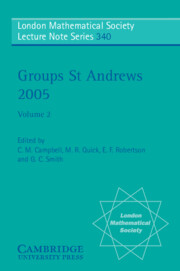Book contents
- Frontmatter
- Contents
- Introduction
- 1 Groups and semigroups: connections and contrasts
- 2 Toward the classification of s-arc transitive graphs
- 3 Non-cancellation group computation for some finitely generated nilpotent groups
- 4 Permutation and quasi-permutation representations of the Chevalley groups
- 5 The shape of solvable groups with odd order
- 6 Embedding in finitely presented lattice-ordered groups: explicit presentations for constructions
- 7 A note on abelian subgroups of p-groups
- 8 On kernel flatness
- 9 On proofs in finitely presented groups
- 10 Computing with 4-Engel groups
- 11 On the size of the commutator subgroup in finite groups
- 12 Groups of infinite matrices
- 13 Triply factorised groups and nearrings
- 14 On the space of cyclic trigonal Riemann surfaces of genus 4
- 15 On simple Kn-groups for n = 5, 6
- 16 Products of Sylow subgroups and the solvable radical
- 17 On commutators in groups
- 18 Inequalities for the Baer invariant of finite groups
- 19 Automorphisms with centralizers of small rank
- 20 2-signalizers and normalizers of Sylow 2-subgroups in finite simple groups
- 21 On properties of abnormal and pronormal subgroups in some infinite groups
- 22 P-localizing group extensions
- 23 On the n-covers of exceptional groups of Lie type
- 24 Positively discriminating groups
- 25 Automorphism groups of some chemical graphs
- 26 On c-normal subgroups of some classes of finite groups
- 27 Fong characters and their fields of values
- 28 Arithmetical properties of finite groups
- 29 On prefrattini subgroups of finite groups: a survey
- 30 Frattini extensions and class field theory
- 31 The nilpotency class of groups with fixed point free automorphisms of prime order
15 - On simple Kn-groups for n = 5, 6
Published online by Cambridge University Press: 20 April 2010
- Frontmatter
- Contents
- Introduction
- 1 Groups and semigroups: connections and contrasts
- 2 Toward the classification of s-arc transitive graphs
- 3 Non-cancellation group computation for some finitely generated nilpotent groups
- 4 Permutation and quasi-permutation representations of the Chevalley groups
- 5 The shape of solvable groups with odd order
- 6 Embedding in finitely presented lattice-ordered groups: explicit presentations for constructions
- 7 A note on abelian subgroups of p-groups
- 8 On kernel flatness
- 9 On proofs in finitely presented groups
- 10 Computing with 4-Engel groups
- 11 On the size of the commutator subgroup in finite groups
- 12 Groups of infinite matrices
- 13 Triply factorised groups and nearrings
- 14 On the space of cyclic trigonal Riemann surfaces of genus 4
- 15 On simple Kn-groups for n = 5, 6
- 16 Products of Sylow subgroups and the solvable radical
- 17 On commutators in groups
- 18 Inequalities for the Baer invariant of finite groups
- 19 Automorphisms with centralizers of small rank
- 20 2-signalizers and normalizers of Sylow 2-subgroups in finite simple groups
- 21 On properties of abnormal and pronormal subgroups in some infinite groups
- 22 P-localizing group extensions
- 23 On the n-covers of exceptional groups of Lie type
- 24 Positively discriminating groups
- 25 Automorphism groups of some chemical graphs
- 26 On c-normal subgroups of some classes of finite groups
- 27 Fong characters and their fields of values
- 28 Arithmetical properties of finite groups
- 29 On prefrattini subgroups of finite groups: a survey
- 30 Frattini extensions and class field theory
- 31 The nilpotency class of groups with fixed point free automorphisms of prime order
Summary
Abstract
A finite nonabelian simple group is called a simple Kn-group if the order of G has exactly n distinct prime factors. M. Herzog and W. J. Shi gave a characterization of simple Kn-group for n = 3, 4, respectively. In this paper, we characterize all simple Kn-groups for n = 5, 6.
Introduction
First we need some notation. Given a natural number n and a finite simple group G, we denote by π(n) and Π(G) the number of distinct prime factors of n and the set of distinct prime factors of |G|, respectively. We say that G is a simple Kn-group if |Π(G)| = n. Also when a, b are two natural numbers, by (a, b) we mean gcd(a, b). The rest of notation is standard and you can find them for example in.
Huppert in studied the following conjecture:
Conjecture 1Let H be a finite nonabelian simple group and denote by cd(H) the set of the degrees of the irreducible complex characters of H. If cd(H) = cd(G) for some finite group G, then G ≅ H × A with A abelian.
He proved this conjecture for some H by the following procedure:
In the first step he showed that G′ = G″. In a second step he proved that whenever G′/M is a chief factor of G, then G′/M ≅ H.
- Type
- Chapter
- Information
- Groups St Andrews 2005 , pp. 517 - 526Publisher: Cambridge University PressPrint publication year: 2007
- 4
- Cited by



